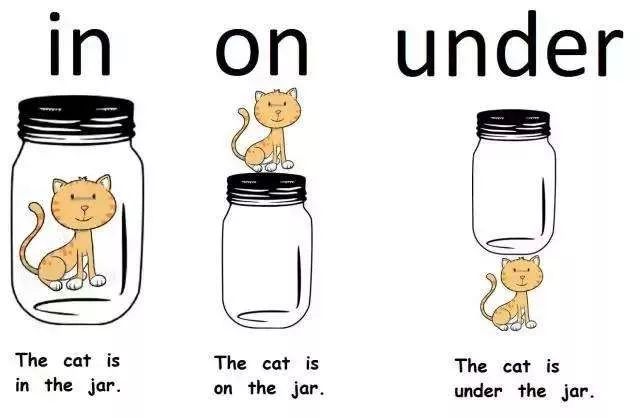
这些就是所谓的介词:也叫前置词。表示(介绍)名词、代词和句子中其它词(名词、代词、动名词 、名词性短语和从句等)的关系。
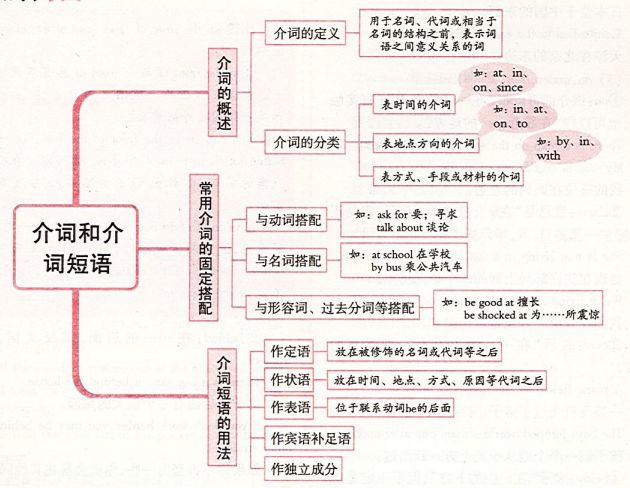
介词一般分为
简单介词(in / on),
合成介词(into / onto / inside / outside / without),
短语介词(out of / in front of / according to)等。
(还有一种叫所谓的重叠介词,也就俩介词连着用:from among 从…当中;from behind 从…后面;until after 直至…之后等,如:from under the bed )
也可以分为 时间介词、 地点介词、 方式介词、 原因介词、 数量介词和 其它介词。
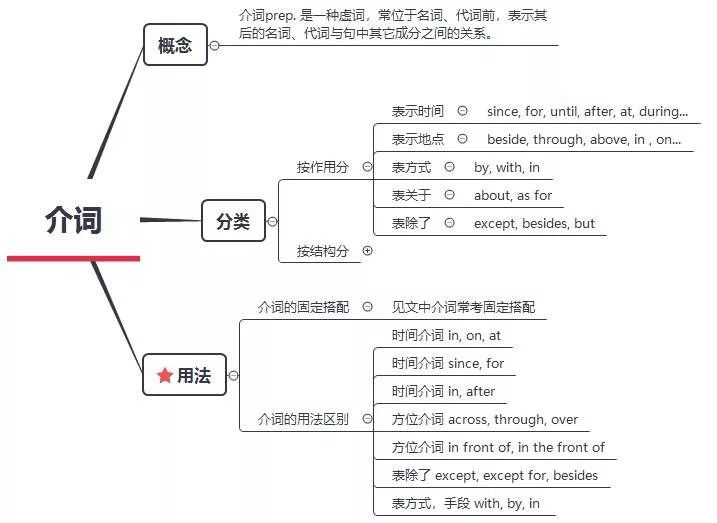
介词preposition,其中 前缀pre 含义是“在……之前”,position 意为“位置”,所以preposition 在英文中的意思就是“在某个位置之前”,这就是介词最一般的用法:放在名词之前,表示位置关系,所以也叫 前置词。
中文里,介字的意思是在两者之间 、两者当中或者介绍,所以构成了媒介、中介、介质、介于等词语。因而,本质上介词的作用其实就是(用来发挥中介 、介绍作用的)一座桥梁。
可能以下这俩概念很多人会傻傻分不清楚:
短语介词:介词本身就是短语,如out of; in front of。
介词短语:介词一般用于名词或者代词前面,表示该词与句中其他成分的关系。介词后面的名词或代词称为介词宾语(如果是人称代词,则要用宾格)。介词和介词宾语合在一起构成介词短语。如:out of the window; in front of the house。

初中阶段学过的介词小结(回顾一下,它们都是啥意思和用法)
in / on / at / to / of / by / for / off / from / near / like / unlike / with / without / after / before / behind / under / in front of / into / onto / out of / between / among / inside / outside / over / above / below / about / around / along (down) / across / through / past / as / except (but) / besides / next to / until (till) / during / against / beside / since / toward(s) / including / according to

理解介词含义最简单直观的方式,当然是各种有“图”有真相了:
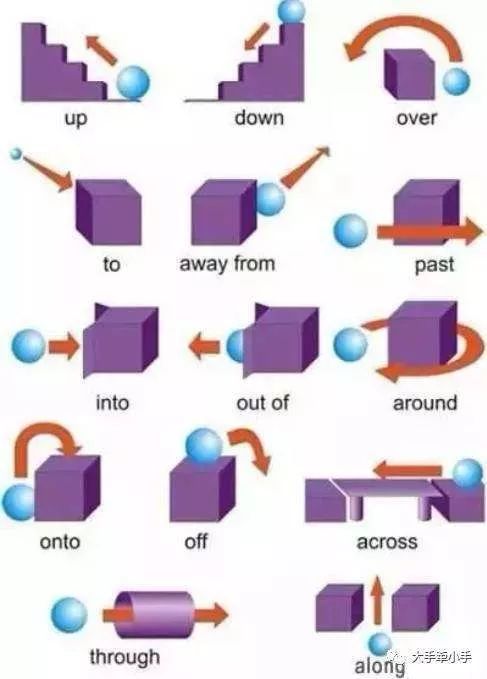
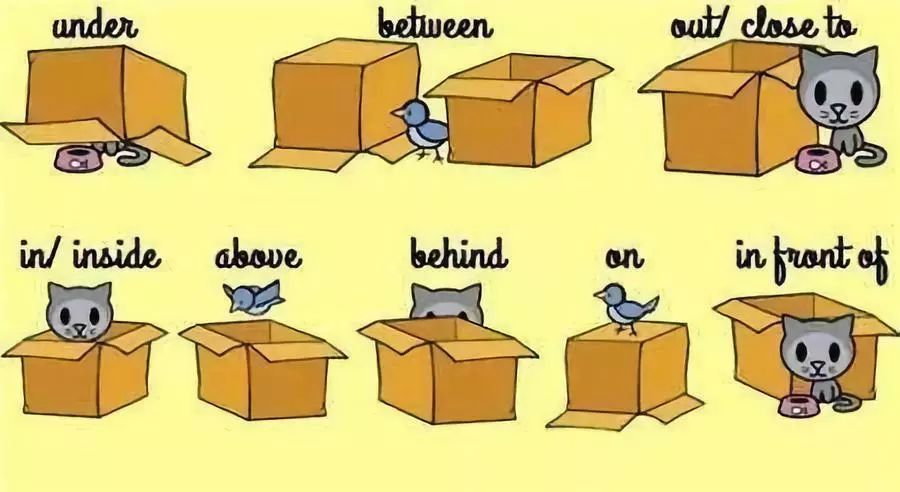
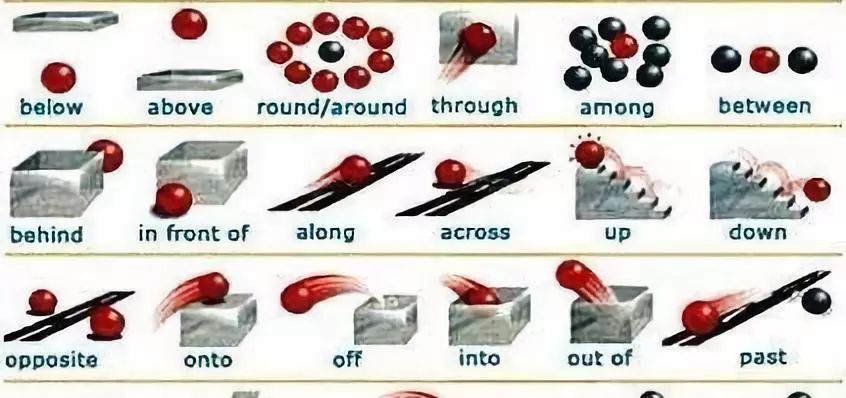
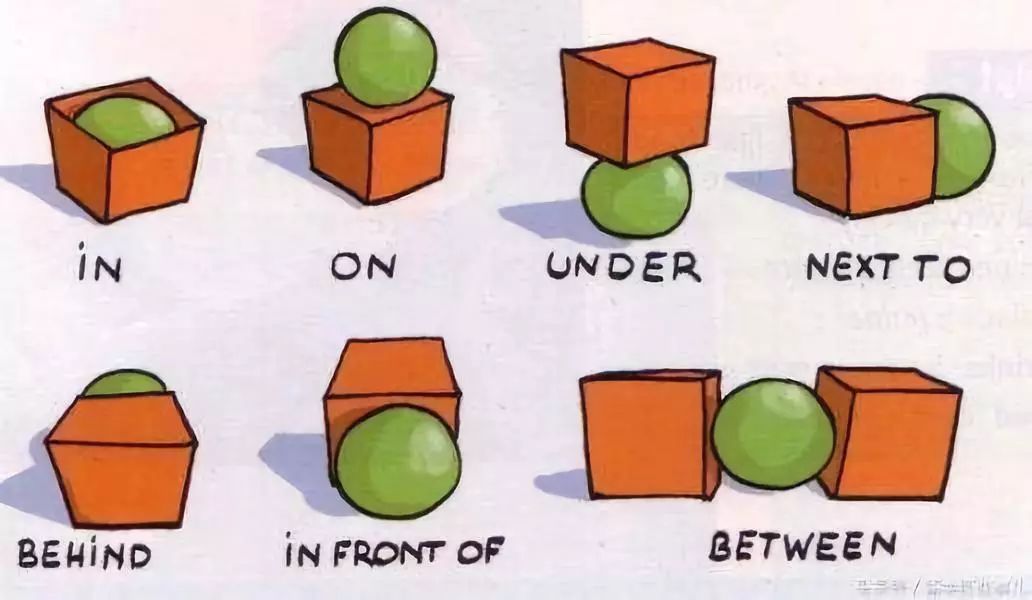
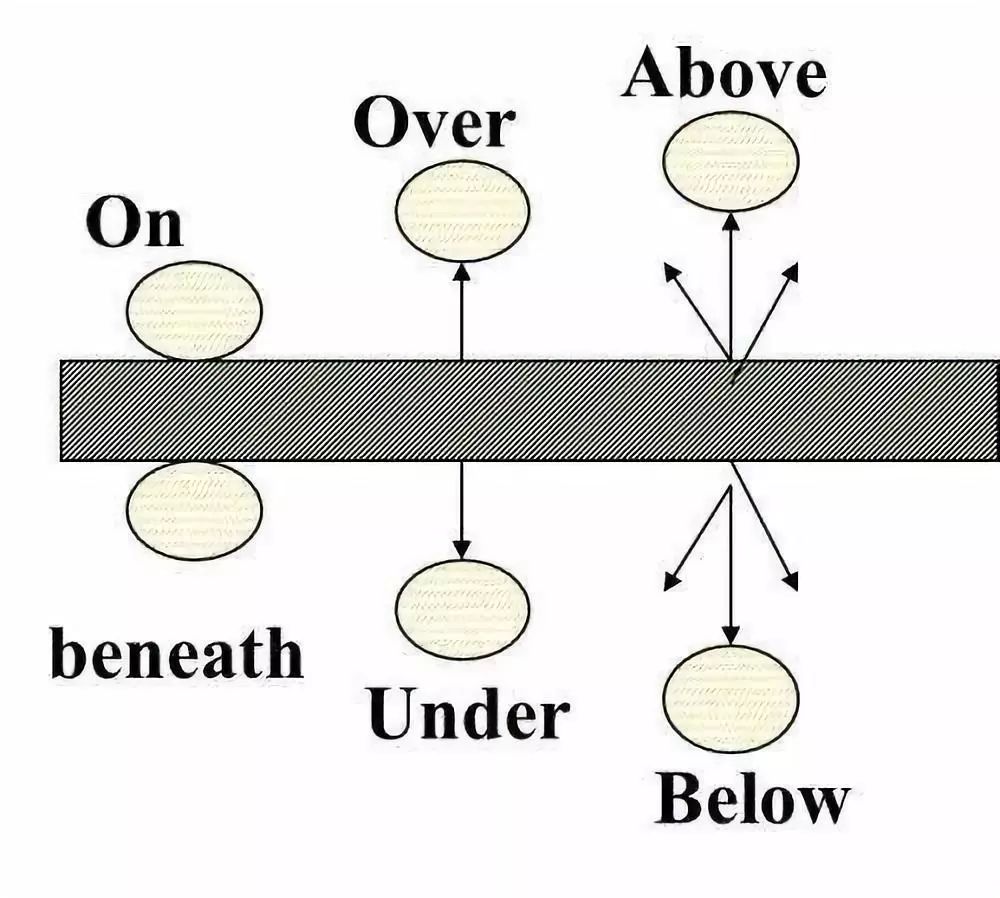
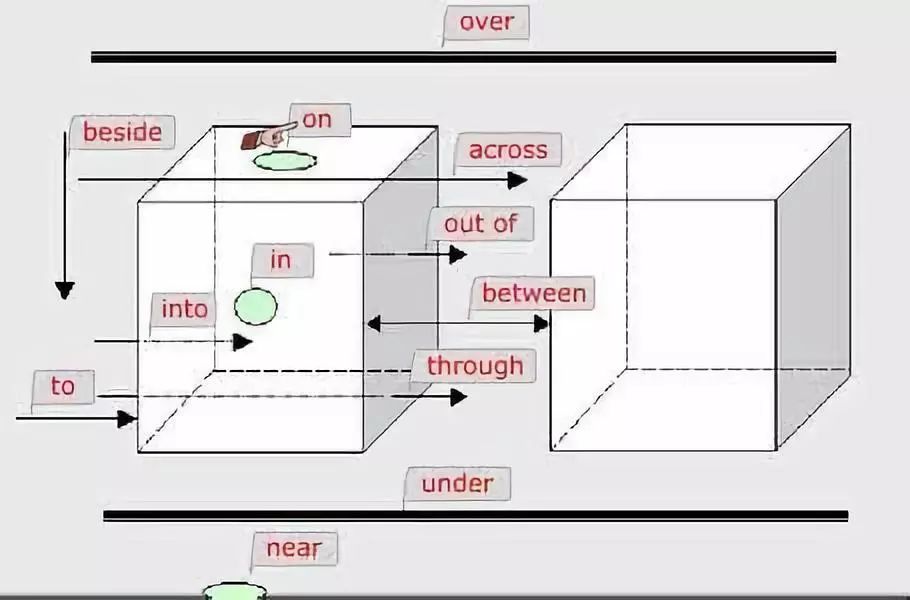
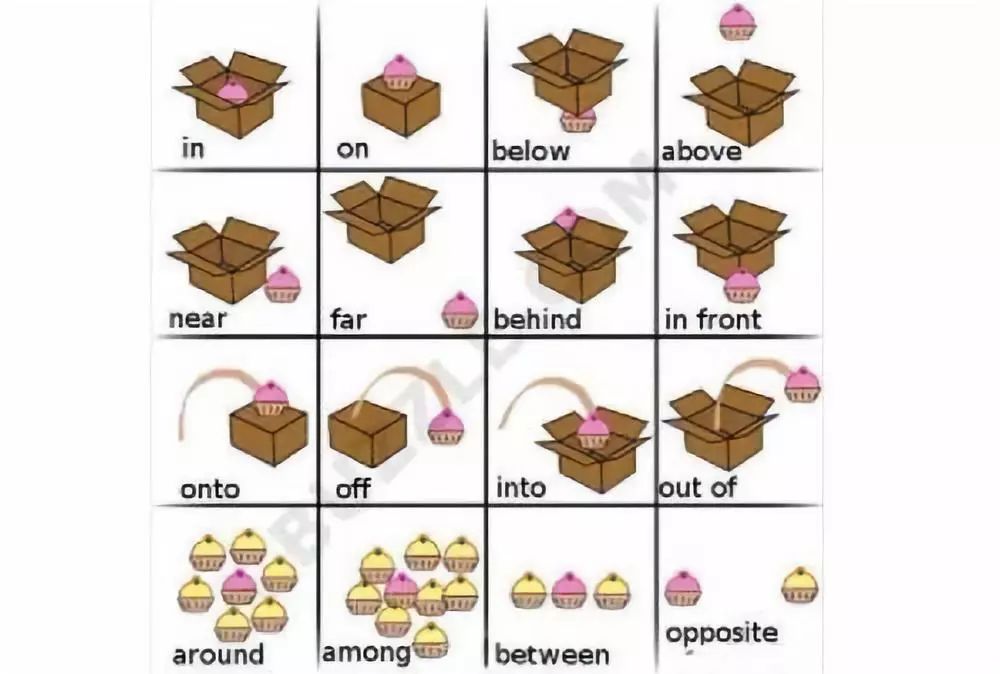
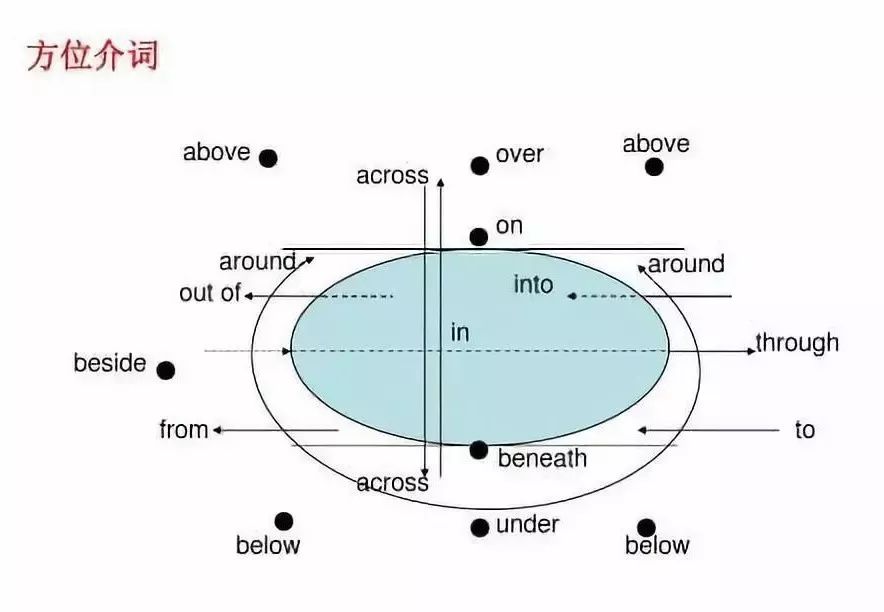

探究:特别需要注意的搭配(研究以下短语可以适用哪些介词,以及原理)
[a]____ the English book, ____ the map, ____ the picture, ____ the photo, ____ the newspaper, ____ the dictionary
[b]____ the road, ____ one’s way, ____ the street, ____ the bus stop, ____ the station, ____ the floor, ____ the playground, ____ the left/right, ____ the other side of, ____ the sea, ____ the land, ____ the (modern) world, ____ the sky, ____ the open air
[c] ____ night/noon, ____ the day(time), ____the middle of the day, ____the afternoon, ____ Tuesday afternoon, ____ Children’s Day, ____ a warm spring afternoon, ____the afternoon of October 1st, 2016, ____ the 21st century, ____spring / summer / winter / autumn,____ New Year’s Day,____ Christmas Day, ____ Christmas
[d]give / send / show / lend / pay / bring / pass / tell / teach / return / throw /…sth.____sb.
buy / get / make / draw / do/ cook / choose / …sth.____ sb.
[e] be strict ____ sb., be satisfied ____ sb., be angry ____ sb., be friendly/kind/polite ____ sb.
[f] have rice ____ breakfast / lunch / dinner; ____ breakfast / lunch / supper / dinner, ____ table, ____work, ____ rest
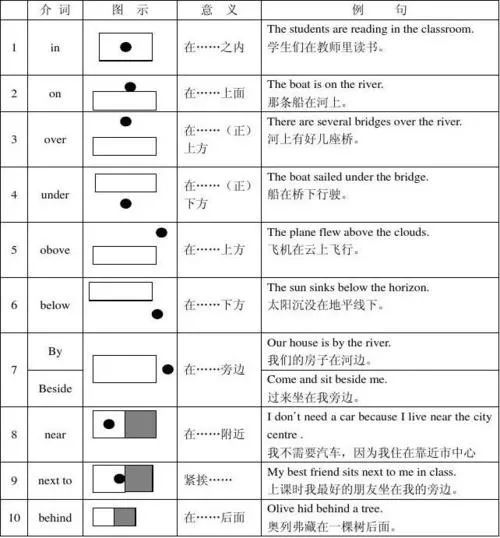
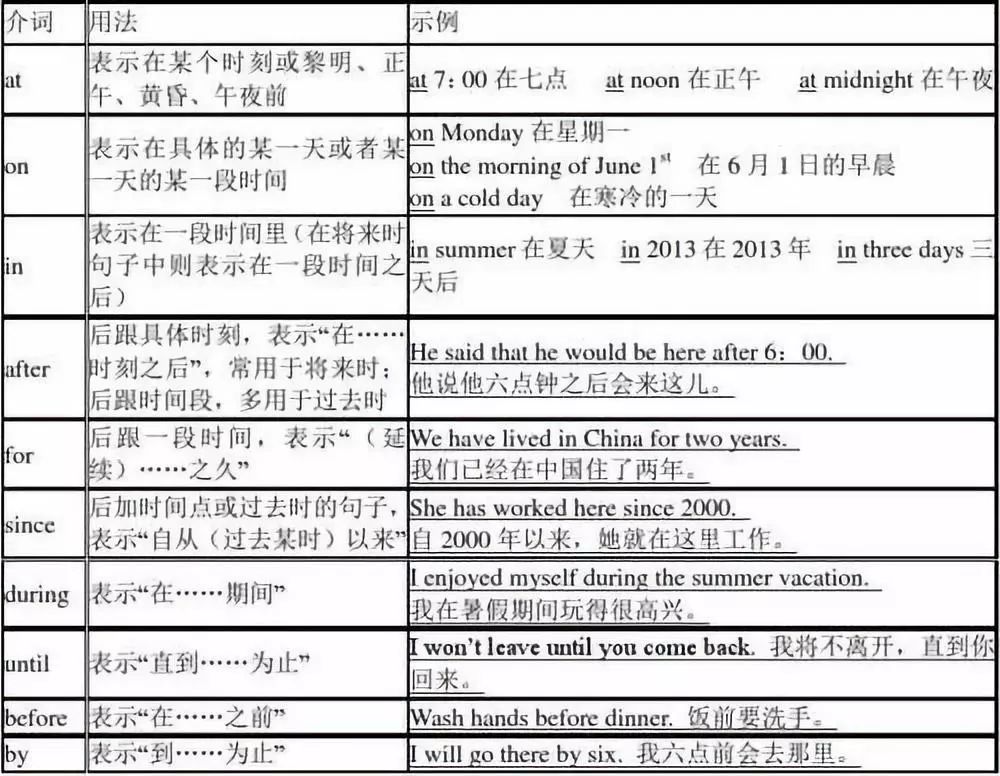
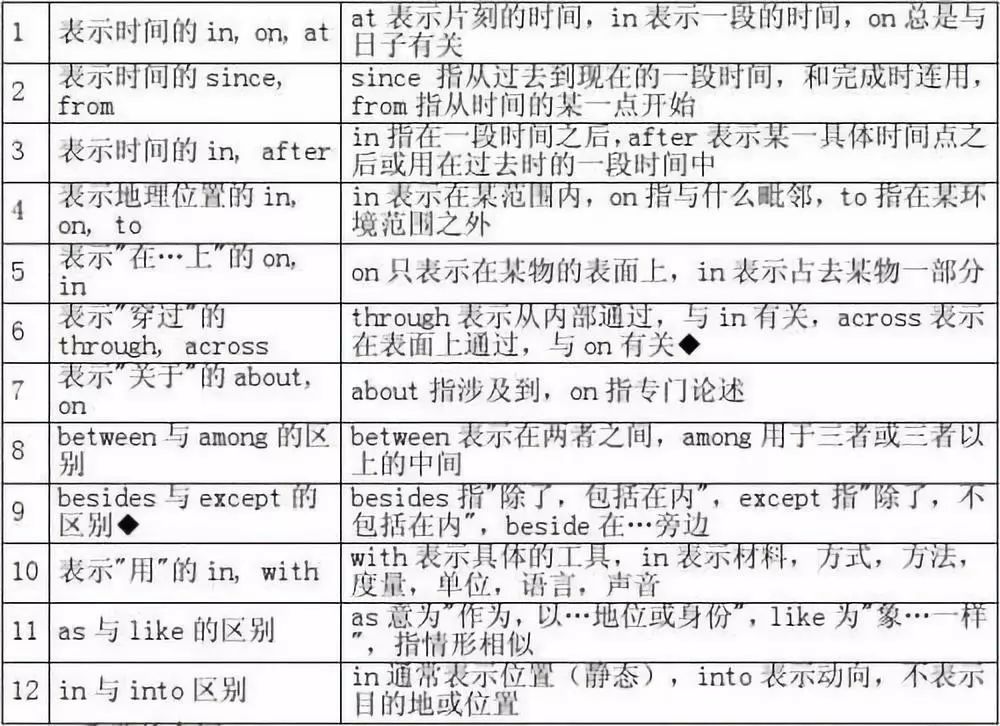
练手:根据句意用适当的介词填空
1. Some students ____ Class 1 are talking ____ Miss Green ____ the new film that was made ____ Zhang Yimou. She stood ____ the front ____ the classroom and a big smile was ____ her face.
2. A teacher ____ English is reading a book ____ English grammar ____ the school yard.
3. “Reading ____ the sun or ____ bed is bad ____ your eyes.”“Don’t worry ____ me.”
4. Some monkeys are playing ____ a tree, and there’re many sweet apples ____ the tree, too.
5. Look ____ the hole ____ the wall. There’s also a map ____ China ____ the wall.
6. I’m a little weak ____ English. It’s really nice / kind ____ you to help me ____ it.
7. He did very well ____ his math exam because he worked hard ____ it ____ a long time.
8. “Best wishes ____ you ____ your birthday!” “Thanks ____ coming ____ my party!”
9. We shouldn’t laugh ____ others when they’re ____ trouble. We should be kind ____ them.
10. The sun rises ____ the east and sets ____ the west every day. The moon goes ____ the earth.
11. HARD is different ____ HARDLY. Do you know the differences ____ them?
12. There’s a bridge ____ / ____ the river. You can go ____ the river ____ its help.
13. He was born ____ December 25, 1998.
He was born ____ December, 1998.
He was born ____ 1998.
He was born ____ Christmas Day ____ 1998.
He was born ____ a cold winter morning ____ 1998.
He was born ____ a Wednesday afternoon.
14. The child fell ____ his bike and lay ____ the ground while he was riding ____ the road.
15. Listen ____ the weather report. The temperature will stay ______ zero ____ the day-time and fall ______ zero ____ night. Please change your clothes ____ time and look ______ yourself.
16. He paid $10 ____ the book, but I only spent $8 ____ it. And she bought one ____ $7 .
17. Don’t look ____ ___ the window ____ class. You should look ____ the blackboard carefully and pay attention ____ what your teacher is talking _______.
18. 18. The thief ran ____ the door, jumped ____ the wall and escaped.
19. Who was speaking ____ the meeting when there was a loud knock ____ the door?
20. Go ________ this road and take the second turning ____ the left. It’s ____ your right.
21. We put the brooms ____ the corner ____ our classroom and we sit ____ the middle.
22. “Hurry up, or we’ll be late ____ school. Our classes begins ____ 8:05.”
“ No hurry. There’s still enough time ____ us to get ____ school ____ time.”
23. There’re lots of fish ____ the water. Fish cannot live _________ water.
24. It’s important ____ us to learn English ____ each other. Or we may fall ____ others.
25. Some farmers are ____ work ____ the farm. They’re growing crops ____ their field.
26. They’re ____ a visit ____ Beijing now. Then they’ll leave ____ Shanghai later on.
27. The ice isn’t thick enough to skate ____. You’d better keep away ____ the lake.
28. “Who will you play ____ in the final volleyball match?” “I haven’t heard ____ this.”
29. Nobody ______/____ Tom was away ____ school yesterday because he was ill ____ hospital.
30. I spent much time ____ reading story-books __________ my summer holiday.

趣话介词:化难为易·趣味思考
对于介词用法,可以在理解原理和联想的基础上化难为易,把貌似严肃、困难的东西趣味化和通俗化,通过“胡思乱想”把它们“整”得很 好玩儿。
记得有一首名叫《校园的早晨》的歌曲:“ 沿着校园熟悉的小路,清晨来到树下读书,初升的太阳照在脸上,也照着身旁这棵小树。亲爱的伙伴亲爱的小树,和我共享阳光雨露,让我们记住这美好时光,直到长成参天大树。” 那我们就可以联想一下里面所包含的介词了:清晨(in the morning),沐浴在阳光里(in the beautiful sunshine),我们沿着校园的小路(walk along the path in the campus)来到树下读书(come to the young tree and read underit ),灿烂的阳光照耀在我们身上(bright sunshine shines on us)可以防止我们缺钙,但我们要躲到树下当然是因为在阳光下读书对我们的眼睛有害(Reading in the sun is bad for our eyes.)。不过,Don’t go out in bad / terrible weather.如果是在糟糕(恶劣)的天气状况下那就还是乖乖呆在教室里读书好了。
我们汉语中习惯上会说初升的太阳是从东方升起的,就像梁启超在《少年中国说》中也是这样写道:“日出东方 ,其道大光。”但英语中却认认真真地跟我们较真儿: The sun rises in the east and sets in the west.仔细想想也真是对的呀:太阳是恒星,它本来就是一直都在东边儿呆着等我们的地球一圈圈地转过来啊,所以是不会从东方升起到西方落下的呢。
墙是一个平面,挂在墙上的一幅画我们当然会用“ There is a picture on the wall. ”但汉朝有个匡衡比较另类,“勤学而无烛,邻舍有烛而不逮。衡乃穿壁引其光,以书映光而读之。”凿壁偷光 ,在墙上挖个洞,那洞当然是在墙里的,所以要改说“ There is a hole in the wall. ”。
同样道理的还有我们习惯上会说在书上、在报纸上、在图画(照片)上和在字典上 ,这些其实都是在说里面的内容,“内容” 就是指内里容纳的东西嘛,所以要用in the book / newspaper / picture (photo) / dictionary,在字典上查单词也就是look up a word in a dictionary,除非真的要说是在一件东西的上面又放了个什么比如说在字典上又放上本书,那自然就可以说There is a book on the dictionary.了。但也有个别例外的,在地图上就要说on the map。
我们可以用at home (在家),at work(在工作),at the office(在办公室),at school(上学),at university(上大学),at the bus stop(在公共汽车站)。使用in的地方则有in a country(在一个国家),in a town(在一个城镇),in a village(在一个村庄),in a square(在广场上),in a street(在街上),in a room(在房间里),in a forest(在森林里),in a wood(在小树林里)等,也就是说,在有边界或被圈起来的地方都可使用in。但如果我们只是想表示“在这个地点”而不是指“在里面”时,也可以在地点前用at。比如可以说 in a zoo,也可以说at a zoo。in是指在动物园里面,at则是指位于动物园这个地点(里、外、门口都可以)。在路上用on the way,在马路上用on the road,而在街上,美式英语中用on the street是强调在路面上,英式英语中则常用in the street表示是由两边的建筑物或花草树木而圈成的空间。on / in the playground也与此相似。如果指的是某条街上的门牌号那就用at。所以,arrive in指的是到达大一些的地方而arrive at指的是到达小一些的地方就很容易理解了。
at有在从事什么工作或者做着什么事情的意思,比如at work是“在工作” ,at rest就是“在休息” ,at table就是在就餐、在吃饭,(同理我们还可以得到一堆 at breakfast / lunch / supper / dinner)。当然如果加上冠词the 成为at the table 之后,意思就变成了在桌子旁边,那就未必是在吃饭了(也许是正围在桌旁打麻将呢) !同样可以对比的短语还有:in hospital(因为生病而住院)和in the hospital(在医院里:呆在医院这个场所里面的可能是病人,但也可能是医生护士),in prison(因为犯罪而坐牢)和in the prison(在监狱里:呆在监狱这个场所里面的可能是犯人,但也可能是狱警或者典狱长)。
on time如果要求的就是赶在某个正点的时间上才叫按时,准时,比如arrive at school on time,说早晨八点到就正好八点到达,这就是准时到校,而in time指的是在某个允许的时间范围之内,并不一定非得在某个正好的时间上,只要还来得及就可以,所以就是及时了。比如陶渊明写了首诗“盛年不重来 ,一日难再晨。及时当勉励,岁月不待人。”体现了他老人家语重心长的谆谆教导 ,这里的及时自然就是in time了。还有一个笑话中说:有一个穿红色衣服的年轻人去赶火车,因为时间紧张,他问农场主:“我想穿过农场的那条小路,这样能够快一点,因为我要乘6时45分的那趟火车,你不会反对吧?”“当然不会。如果农场里的那头公牛看见了你,你乘6时15分的那趟火车也来得及 (in time)!”
欧阳修在《醉翁亭记》的开篇写道:“ 环滁皆山也” ,也就是说Chuzhou is among the hills / mountains.或者There are hills / mountains around Chuzhou.如果说北京和广州之间有条铁路,就要用There is a railway between Beijing and Guangzhou.这是因为,between指的是位置居于两者之间,而among指的是三者之间。
有些介词,比如at, off, into, out (of), onto等,具有明显的动态含义。比如有个歇后语说:“猪八戒照镜子—— 里外不是人。” 翻译成英语就会是Mr.Zhu looked into the mirror. 或者Mr.Zhu looked at himself in the mirror.目光都看到镜子里面去了,当然也就具备了一种动态的含义。“ 同理可证” 的还有一则文人趣事,有一次明朝皇帝为了考验一下号称学识渊博、才思敏捷的大学士解缙,就跟他开玩笑说:“昨天晚上宫中有喜 ,你以此为题写首诗吧!”解缙听皇帝说“有喜” ,按说应该就是皇子降生了嘛,于是为了讨好皇帝便脱口而出:“君王昨夜降金龙” 。皇帝却接着说:“生的是个女孩” ,解缙也就见风使舵接着吟道:“化作嫦娥下九重” 。但皇帝又说:“她已经死了” ,解缙也只好接着改:“料是人间留不住” 。解缙本来是想给后面再说金龙、嫦娥化身而来的公主又要升天了做个铺垫,皇帝却还是不依不饶地要将难为人进行到底:“已经把她抛到水里去了” ,解缙反应得也敏捷得体:“翻身跳入水晶宫”。把这首诗中的介词 短语翻译出来大致就是:be born in the palace 和cannot stay in this world 中的in 就是静态的含义,而jump into the palace of Dragon King 中的into 则明显是动态的含义。
俗话说“兔子急了咬人 ,狗急了跳墙。”跳墙就是 jump over the wall;动画片中的崂山道士学穿墙术,是为了能go through the wall ;而across指的则是从表面上横穿、越过(直接用动词cross也可以)。老师教育学生们要“日行一善” ,比如在街上帮老人过马路什么的,结果第二天有三个学生迟到了,理由是“扶老太太过马路” 。老师很纳闷地问:扶老太太across the road为什么还需要三个人?学生们回答说:“老太太本来并不愿意过马路的 ,我们三个人把她架了过去!”
还有含有感情色彩的介词。从我们都比较熟悉的laugh at(嘲笑)我们就可以了解到at有时会有一种不怀好意的含义。come to意思是来到,比如歌词“你来到我身边 (come to me),带着微笑(with a smile),带来了我的烦恼” ,而换作come at后立刻就成了袭击、向……扑过来,歌词的“意境”自然也就转成了极其恐怖的“ 你扑到我身边,带着狞笑”。 throw it to me 是把某个东西抛给我,而throw at 则是恶狠狠地向我砸了过来(就是那种简直跟我有不共戴天之仇的感觉)。
一旦把这些介词的用法彻底想通了,综合起来就比较好玩了。清代做官素来两袖清风的文人郑板桥回到扬州后,有个看来比较“仇富 ”的小偷以为他会存下很多钱财,就趁着月色来他家行窃(steal sth. from Mr. Zheng)了。不料,那晚郑板桥恰巧没有睡着,He was only lying in bed. 但他并没有惊惶失措地大喊“抓贼啊” ,反倒从容自若地吟起诗来:“细雨蒙蒙夜沉沉,梁上君子进我门 (A thief came into my house in/ duringthe rainy night.)。”小偷一听知道自己已被发现,就停住了手脚。郑板桥继续吟诗:“腹内诗书存千卷,床头金银无半文。”意思是说脑袋里学问蛮大的 (There’s a lot of knowledge in my brain/head. ),可就是穷得叮当响呢(There’s no money on the bed/at the end of the bed/ at home at all.)。小偷一听没钱,就要转身出门。郑板桥又吟:“出门休惊黄尾犬” ,小偷想:既然有狗不方便go through the door,那还是翻墙而去(jump over the wall)吧。这时又听郑板桥吟道:“越墙莫损兰花盆” ,小偷仔细一看,果然墙上有一盆兰花on the wall,就小心地躲开。他刚跳到墙外,又听郑板桥在屋里吟诗:“天寒不及披衣送,趁着月色赴豪门。”想 想郑板桥也的确是够“损”的:大概觉着自家没钱怪对不住人家的 ,所以就“教唆”这个还比较知趣的“梁上君子”趁着 夜色再到有钱人家去瞧瞧呢!